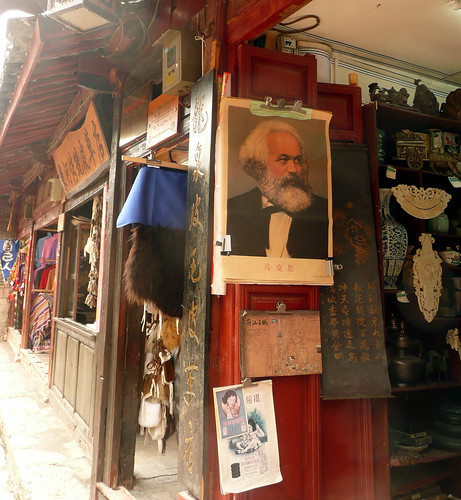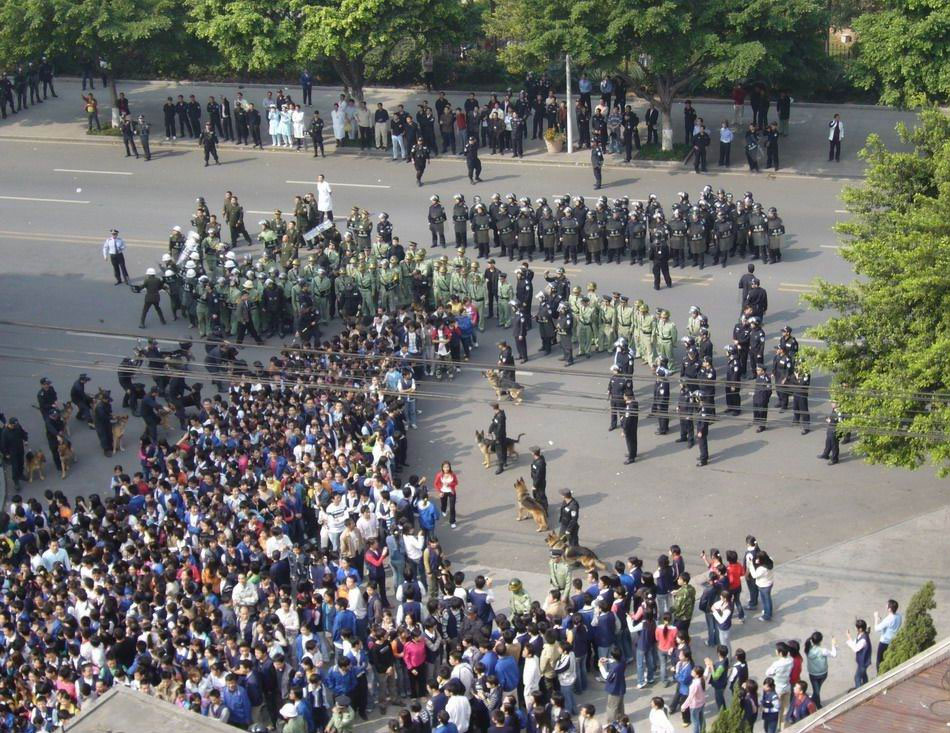Communist Party of China
China: An international dialogue on Marx

A trader in Lijang, China, selling images of Karl Marx. Photo by Malias.
By Norman Levine
January 4, 2010 -- Links International Journal of Socialist Renewal -- Organised by Marcello Musto of York University (Toronto, Canada), an international delegation of scholars from Canada (Marcello Musto and George Comninel), USA (Norman Levine), England (Terrell Carver), Japan (Hiroshi Uchida and Kenji Mori) and South Korea (Seongjin Jeong) participated in a two-week series of colloquiums and lectures in China. This delegation was invited and graciously hosted by Fudan University of Shanghai and Nanjing University (two of the top five universities in China), and by the Chinese Academy of Social Sciences (CASS) and the Chinese Central Compilation and Translation Bureau (CCTB) of Beijing. The faculties and administration of each of these institutions partnered in these colloquiums, which also saw the participation of Chinese academics from 23 different universities (and, among them, of many deans and chairs of departments).
China, Mao and the global neoliberal offensive
Review by Chris Slee
The Rise of China and the Demise of the Capitalist World Economy
By Minqi Li
Monthly Review Press, New York, 2008
January 4, 2011 – Links International Journal of Socialist Renewal -- Minqi Li’s The Rise of China and the Demise of the Capitalist World Economy deals with a range of topics including the history of the Chinese Revolution, China's role in the world economy today and the future of the world economy. This review will not deal with every aspect of the book, but will focus on Minqi Li's discussion of China's history, economics and politics, and its current role in the world.
China: Workers' strikes -- what did they win?
By Boy Lüthje
Tariq Ali on Mao Zedong and communism in China
"Mao images are for sale, popular in China and not just with tourists, hi
The left cannot ignore China’s achievements, but neither can it be too celebratory

Rural poverty in China is much higher than urban poverty.
The left cannot ignore China's achievement in poverty reduction

Source:UN Human Development Report, 2007/2008.
By Reihana Mohideen
October 15, 2010 -- China’s achievements in reducing poverty have been outstanding. From 1978 – when the restructuring of the Chinese economy began – to 2007 the incidence of rural poverty dropped from 30.7% in 1978 to 1.6% in 2007. The biggest drop took place between 1978 and 1984 when the number of rural poor almost halved, from 250 million in 1978 to 125 million in 1985. During this period the per capita net income of farmers grew at an annual rate 16.5%. Urban poverty, measured by an international standard poverty line of US$1 per day, reduced from 31.5% in 1990 to 10.4% in 2005. No other Third World country has achieved so much and made such a significant contribution to reducing global poverty, as China has, over this period.
China: In who's interest does the state serve?

China, capitalist accumulation and the world crisis

By Martin Hart-Landsberg
[A version of this article appeared in the South Korean journal, Marxism 21. It has been posted at Links International Journal of Socialist Renewal with Martin Hart-Landsberg’s permission.]
February 2010 -- The consensus among economists is that China’s post-1978 market reform policies have produced one of the world’s greatest economic success stories. Some believe that China is now capable of serving as an anchor for a new (non-US dominated) global economy. A few claim that the reform experience demonstrates the workability (and desirability) of market socialism. This paper is critical of these views.
China today: socialist or capitalist?
November 13, 2009 -- Links International Journal of Socialist Renewal has published a number of articles on the Chinese Revolution and the subseque
China: Youth and the Cultural Revolution

For more on the Chinese Revolution, click HERE.
CPI (ML) Liberation: Cooperation, not confrontation, should be the basis of India's China policy

